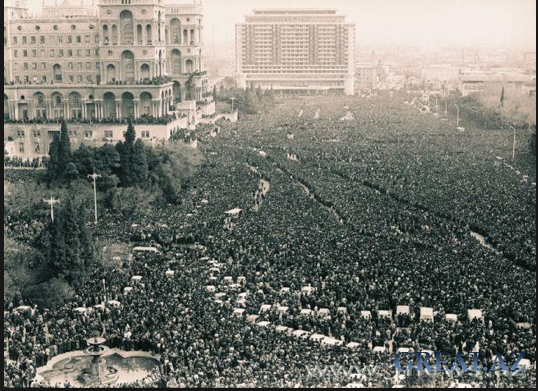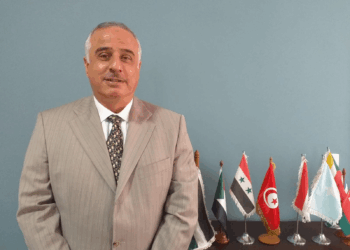Elkhan Polukhov
Ambassador of Azerbaijan
The Azerbaijani people all around the world commemorate, on this saturday (20th), a tragic episode in the history of country named lately Black January 20th. For us is an important moment of reflection and reverence of the memory of those who died for our freedom. 28 years ago, on that date of 1990, Soviet troops invaded Baku, the capital of Azerbaijan, in order to suppress the movement of independence in Azerbaijan. On that day, the massacre perpetrated by Soviet troops against the civilian population with unprecedented cruelty left 133 dead and more than 700 wounded. For several days, those 26,000 troops cracked down on protesters, firing into crowds without warning and killing innocent people. Among the victims were seniors, women, children and even the medical staff.



Heydar Aliyev’s statement, coming as Moscow continued its brutal crackdown in Baku, had a profound impact on international community. Many in the West up to that point had maintained in their own minds a clear distinction between the situation in Eastern Europe and the three Baltic states, on the one hand, and the 12 republics of the Soviet Union, on the other. Such observers in government and out by that time viewed the regimes in Eastern Europe and the Baltic countries as illegitimate, as kept in power only by the threat or application of Soviet force, but most of them viewed the rest of the USSR as somehow a single country, one that they hoped Mikhail Gorbachev would reform. Heydar Aliyev’s statement changed this approach!
The invasion was carried out as a violent response to the popular demand for independence in Azerbaijan. Even after such cruelty, the Soviet leadership was not able to stop the search for the freedom of the Azerbaijani people and finally, Azerbaijan declared the restoration of its independence on October 18, 1991.
Notwithstanding its tragic consequences, January 20th marked in the history of Azerbaijan as one of the most glorious pages. Every year, on this day, hundreds of thousands of Azerbaijani people visit the Alley of Honor in order to honor the victims of the Black January. Liberation movement which has started long before this event became irreversible after this day. Today Azerbaijan enjoy it independence thanks to these people who gave up their lives with believe that one day their country will be independent. Memory about these people will remain in our hearts forever.
Brazil was among the first countries of Latin America who has recognized independence of Azerbaijan establishing diplomatic relation with young republic in 1993 and this year we will commemorate 25th anniversary of this act. As a young democracy official Baku see Brasilia as a strong and reliable partner on international arena and this approach receive adequate response from the government of Federative Republic of Brazil.
Bough countries share common vision on a number of issues of international agenda and cooperation in political, economic, cultural and other spheres growth day by day turning our relation to the real friendship between our friendly nations.

Os azerbaijaneses em todo o mundo lembram, nesse sábado, 20, um episódio trágico na história do país, chamado ultimamente de Janeiro Negro. Para nós, é um momento importante de reflexão e reverência a memória daqueles que morreram pela nossa liberdade. Há 28 anos, naquela data de 1990, tropas soviéticas invadiram Baku, capital do Azerbaijão, a fim de reprimir o movimento de independência no Azerbaijão. Nesse dia, o ato de massacre perpetuado pelas tropas soviéticas contra a população civil com uma crueldade sem precedentes deixou 133 mortos e mais de 700 feridos. Durante vários dias, essas 26 mil tropas reagiram aos manifestantes, atirando em multidões sem aviso e matando pessoas inocentes. Entre as vítimas havia idosos, mulheres, crianças e até mesmo a equipe médica.
Na primeira semana após a invasão, em 1990, a televisão estatal local foi fechada. Os agentes soviéticos haviam explodido as torres de transmissão em Baku horas antes dos tanques entrarem na cidade. Apesar das drásticas restrições impostas aos repórteres internacionais para cobrir este evento, reportagens sobre os crimes cometidos pelo exército soviético foram publicados na imprensa internacional. O massacre tornou-se conhecido no mundo todo como Janeiro Negro.
Talvez o evento mais importante na tragédia do Janeiro Negro tenha ocorrido não em Baku, mas em Moscou. Um dia depois que às forças soviéticas entraram na capital do Azerbaijão, Heydar Aliyev, que havia sido secretário do partido comunista no Azerbaijão, membro do Politburo Soviético e um alto funcionário de segurança, foi até o escritório de representação permanente da RSS do Azerbaijão, na capital soviética, para dar o seu voto a favor do povo azerbaijanês e, portanto, contra o regime soviético do qual ele fez parte. Essa ação teve grandes conseqüências.
A declaração de Heydar Aliyev durante Janeiro Negro serviu de base tanto para a sua assunção na presidência de um Azerbaijão independente vários anos depois e pelo papel que definiu no sistema político azerbaijanês até hoje. Ao se colocar ao lado do povo, em vez do exército soviético, mostrou-se ser um verdadeiro azerbaijanês e mostrou o caminho para que muitos outros seguissem.
A declaração de Heydar Aliyev, que veio quando Moscou continuava a sua brutal repressão em Baku, teve um impacto profundo na comunidade internacional. Muitos no Ocidente até esse ponto mantiveram em suas próprias idéias uma clara distinção entre a situação na Europa Oriental e os três estados bálticos, por um lado, e as 12 repúblicas da União Soviética, por outro. Tais observadores do governo e, naquela época, viram os regimes da Europa Oriental e dos países bálticos como ilegítimos, mantidos no poder apenas pela ameaça ou aplicação da força soviética, mas a maioria deles via o resto da URSS como de alguma forma um único país, que eles esperavam que Mikhail Gorbachev se reformasse. A declaração de Heydar Aliyev mudou essa abordagem!
A invasão foi realizada como uma resposta violenta à demanda popular de independência no Azerbaijão. Apesar do derramamento de sangue, a liderança soviética não foi capaz de parar a busca pela liberdade do povo azerbaijanês e finalmente, o Azerbaijão declarou a restauração da sua independência no dia 18 de outubro de 1991.
Apesar das consequências trágicas, o dia 20 de janeiro marcou a história do Azerbaijão como uma das páginas mais gloriosas. A cada ano, neste dia, centenas de milhares de azerbaijaneses visitam a Avenida dos Mártires – homenageando as vítimas do Janeiro Negro. O Movimento de libertação que começou muito antes deste evento se tornou irreversível depois deste dia. Hoje, o Azerbaijão desfruta da independência graças a essas pessoas que desistiram de suas vidas por acreditar que um dia seu país será independente. A memória dessas pessoas permanecerá em nossos corações para sempre.
O Brasil foi um dos primeiros países da América Latina que reconheceu a independência do Azerbaijão estabelecendo as relações diplomáticas com a nova República em 1993, e neste ano vamos comemorar o 25º aniversário das relaçoes bilaterais. Como um jovem oficial da democracia, Baku vê Brasília como um parceiro forte e confiável no âmbito internacional e essa abordagem recebe uma resposta adequada do governo da República Federativa do Brasil.
Ambos os países compartilham uma visão comum sobre uma série de questões da agenda internacional e cooperação em áreas políticas, econômicas, culturais e outras, crescendo dia a dia, estabelecendo nossa relação de amizade verdadeira entre as nossas nações amigas.







